
|
As the adage goes, business and family don't mix. But what about business and politics?
More than ever, the state of political discourse in the United States is shrouded in tension, disconnect, and opposing viewpoints. Conversations about politics are fraught with stress, and people are increasingly unable to hear each other out. It's a tricky climate for small business owners, whose livelihoods are more precarious than the average worker, and who are also feeling the pressure to align themselves with certain ideological camps.
Taking a stance has the potential to bring a business to its knees or create a groundswell of grassroots support. The pendulum can swing either way, and its arc is incredibly wide. We surveyed 434 small business owners to find out how they felt about sharing their political leanings under their brand's banner, whether they were comfortable serving individuals with opposing views, which groups had the most potential to disrupt local businesses, and more.
Many small business owners feel pressure to express political views under their company's banner. But are they comfortable doing so?
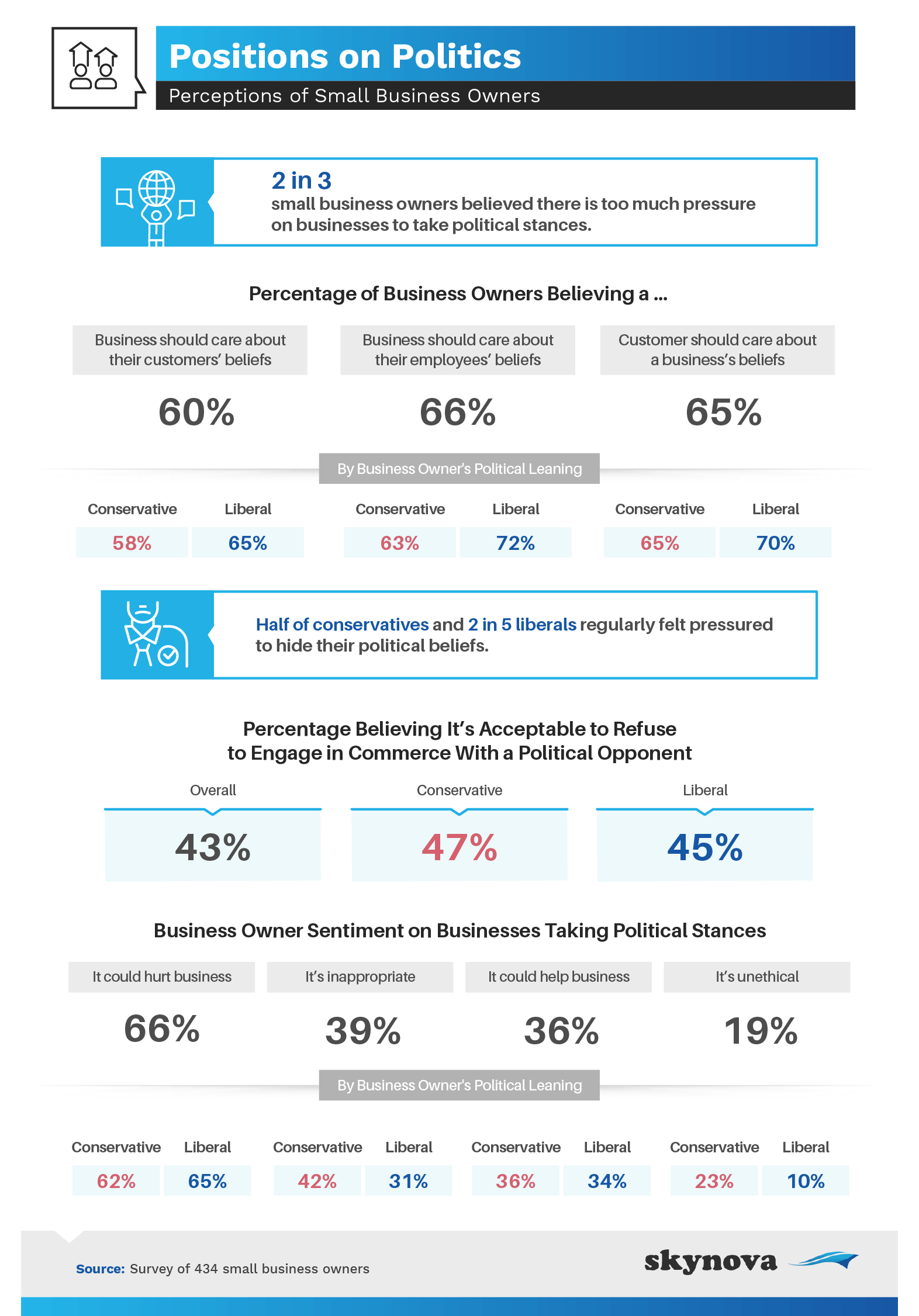
Approximately two-thirds of small business owners agreed that businesses should care about their customers' (60%) and employees' beliefs (66%) and that customers should care about a business's beliefs (65%). However, both sides were nearly in agreement that it was acceptable to refuse to do business with a political opponent (47% of conservatives and 45% of liberals).
These situations happen more often than you might think. In 2018, White House Press Secretary Sarah Sanders was refused service at a restaurant in Virginia due to her political involvement with President Trump, and one particularly high-profile case in which a Colorado baker refused to make a custom cake for a same-sex wedding made it all the way to the Supreme Court.
While 66% of small business owners believed expressing their political views could hurt business, another 36% said it might actually help their business. Just under 20% found the idea downright unethical, while 39% called it inappropriate. Despite the general sentiment that mixing politics and business might do more harm than good, two-thirds of small businesses felt an overwhelming pressure to take a political stance.
Taking a political stance looks different for every business. Here's how small business owners navigate sharing their beliefs, and how those choices have impacted their companies.
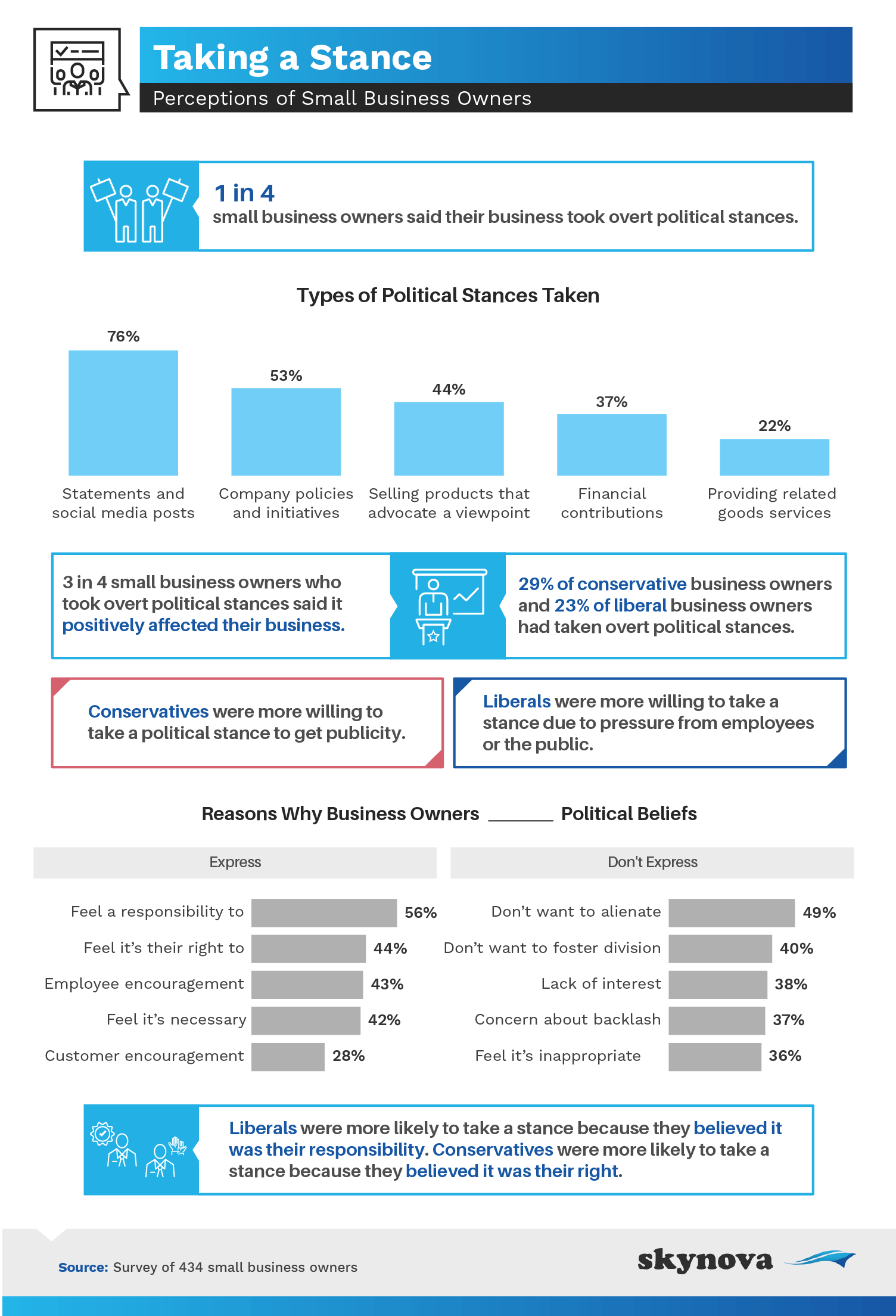
One in 4 small businesses surveyed said they had taken an overt political stance (29% of conservatives and 23% of liberals). Their actions were generally rooted in different reasons, though: Conservatives were more likely to take a stance for publicity's sake, while liberals felt more pressure to do so either from their employees or the public.
No matter their political affiliation, business owners were most likely to express themselves because they felt a responsibility to do so (56%), because they felt it was their right to do so (44%), and because their employees encouraged it (43%). On the flip side, businesses were most likely to abstain due to fear of alienation (49%) and not wanting to foster division (40%).
Three-quarters of businesses that took a stance had taken to social media and made specific statements to express their views, 53% incorporated their views into company policies and initiatives, 44% sold products that advocated a specific viewpoint, 37% made financial contributions to relevant causes, and 22% provided goods and services related to upholding their beliefs.
The aftermath of a political statement may also depend on the medium through which it is communicated or be a case of knowing your audience. A 2018 Inc. article listed two examples that yielded two completely different outcomes: One Tucson restaurant was forced to permanently close due to a Facebook post in support of Donald Trump and standing for the national anthem, while rejecting global warming. Meanwhile, the CEO of a spice company in Wisconsin sent an email blast to customers that smeared Trump and offered up free Mexican vanilla as a response to his comments about Mexico. This email was, apparently, a boon for business.
The difference? One of these expressions was posted to a public forum (Facebook), which can easily invite criticism from opponents, while the other was sent to a select group of people (the company's email list) that the CEO may have known to be generally left-leaning.
Which political topics are more commonly expressed by small businesses, and which ones are more or less taboo?
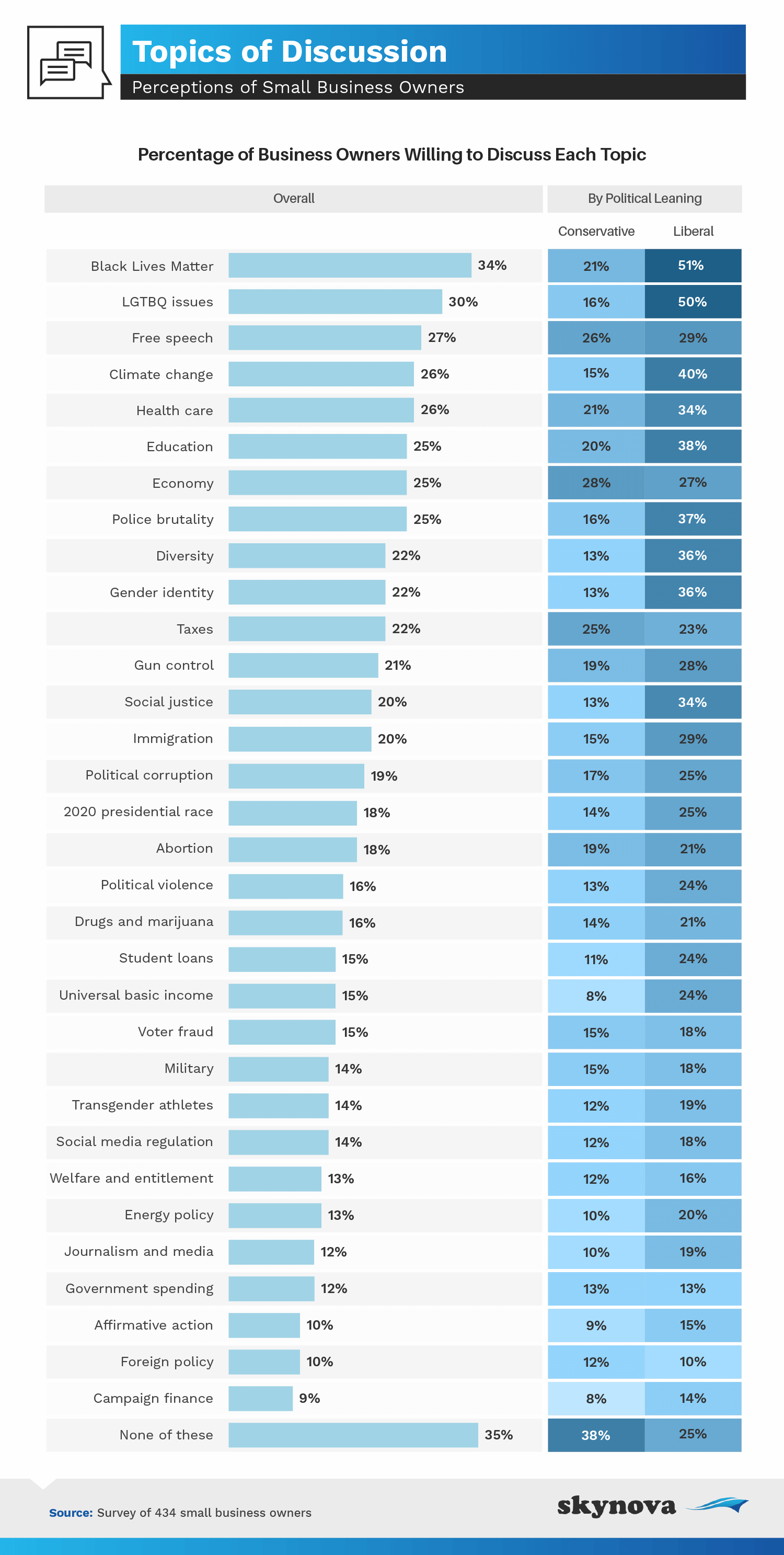
The year 2020 will be remembered for many different reasons. In the United States, one of the year's most important moments was the police killing of George Floyd on May 25 in Minneapolis, Minnesota. Blowback quickly rippled throughout the country, and the ensuing Black Lives Matter (BLM) protests saw thousands of people taking to the streets in more than 140 American cities.
Technically, the political viewpoint that small business owners were most likely to share was, well, none of them. However, among the topics provided in our survey, business owners were most likely to discuss BLM above all others (34%), though liberals did account for a large portion of that percentage (51% versus 21% of conservatives). LGBTQ issues came in second, at 30%, followed by free speech at 27%.
What set free speech apart, though, was its relative importance to individuals on each side of the political spectrum: While many of the issues presented seemed to be significantly more important to one party than the other (for example, 50% of liberals were willing to discuss LGBTQ issues, compared to just 16% of conservatives), free speech garnered almost identical numbers from both sides: 29% of liberals and 26% of conservatives.
Given the political polarization occurring in the United States regarding everything from the severity of the coronavirus pandemic to viewpoints on race and gender - including intergenerational polarization within the same political party (in this case, regarding climate change) - it's no wonder free speech is something that both sides hold near and dear.
Most respondents expressed hesitation when it came to chatting about their political opinions with employees and customers.
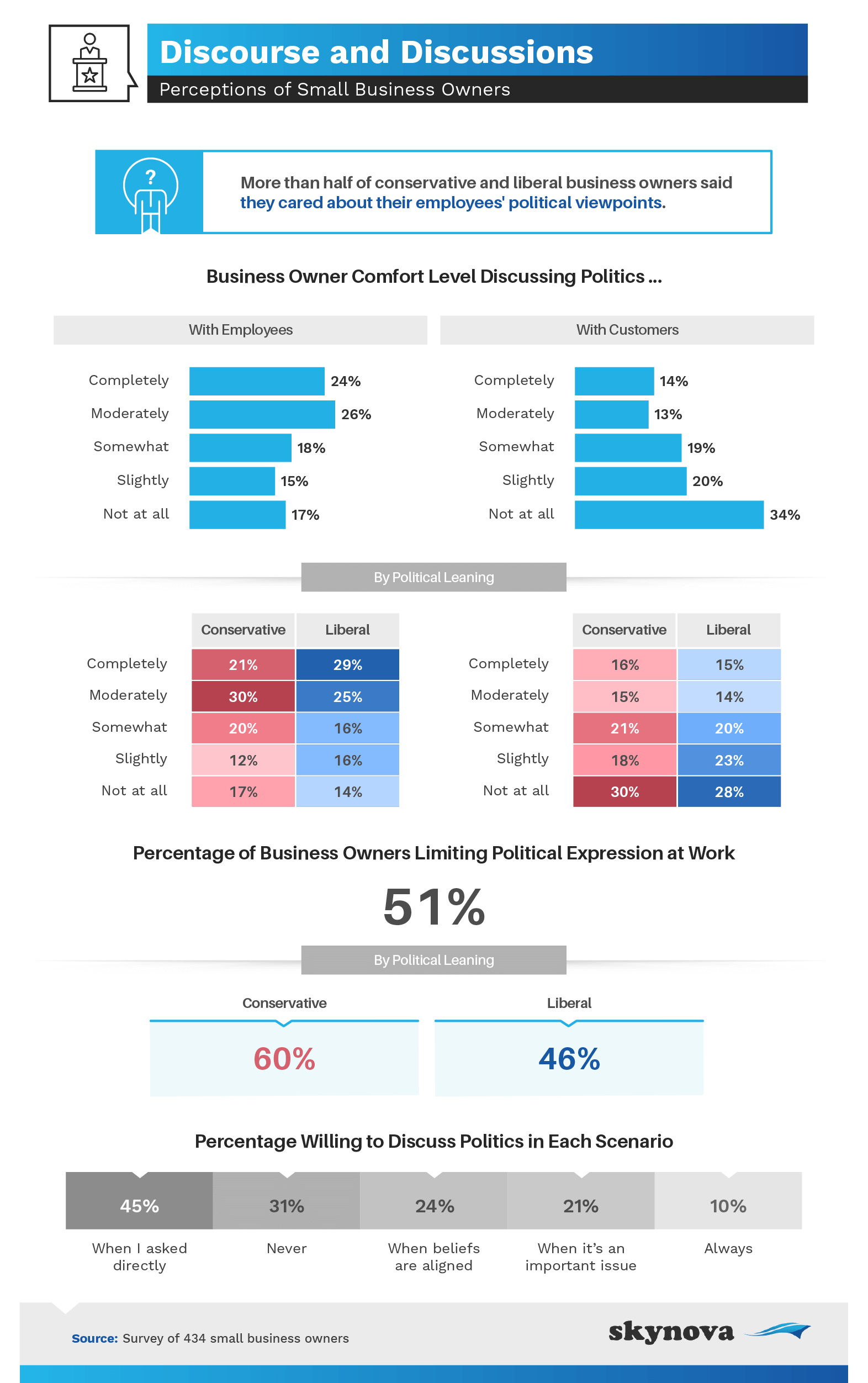
A good rule of thumb is to tread lightly when discussing topics like politics and religion, since you never know when you might put your foot in your mouth or offend someone. This is doubly true when you are a business owner speaking to an employee or customer. There is a certain amount of decorum expected when it comes to sensitive topics in the workplace, and while these rules may apply a little more strictly to large corporations, small businesses abide to different degrees.
Just 24% of business owners said they were totally comfortable discussing politics with employees, and another 26% were moderately comfortable. Seventeen percent were not at all comfortable. When it came to customers, the grand majority (34%) were totally uncomfortable broaching political topics, and 20% were slightly comfortable. Meanwhile, just 14% were completely at ease with the idea.
In general, liberals and conservatives had similar comfort levels regarding their openness about political beliefs, with 51% limiting political expressions in their workplace. However, right-wingers (60%) were more likely to do so, compared to left-wingers (46%). People were most willing to have these discussions when asked (45%), but 31% maintained they absolutely never would.
Which political groups are more frequently shunned by businesses with opposing views? Which ones get a pass?
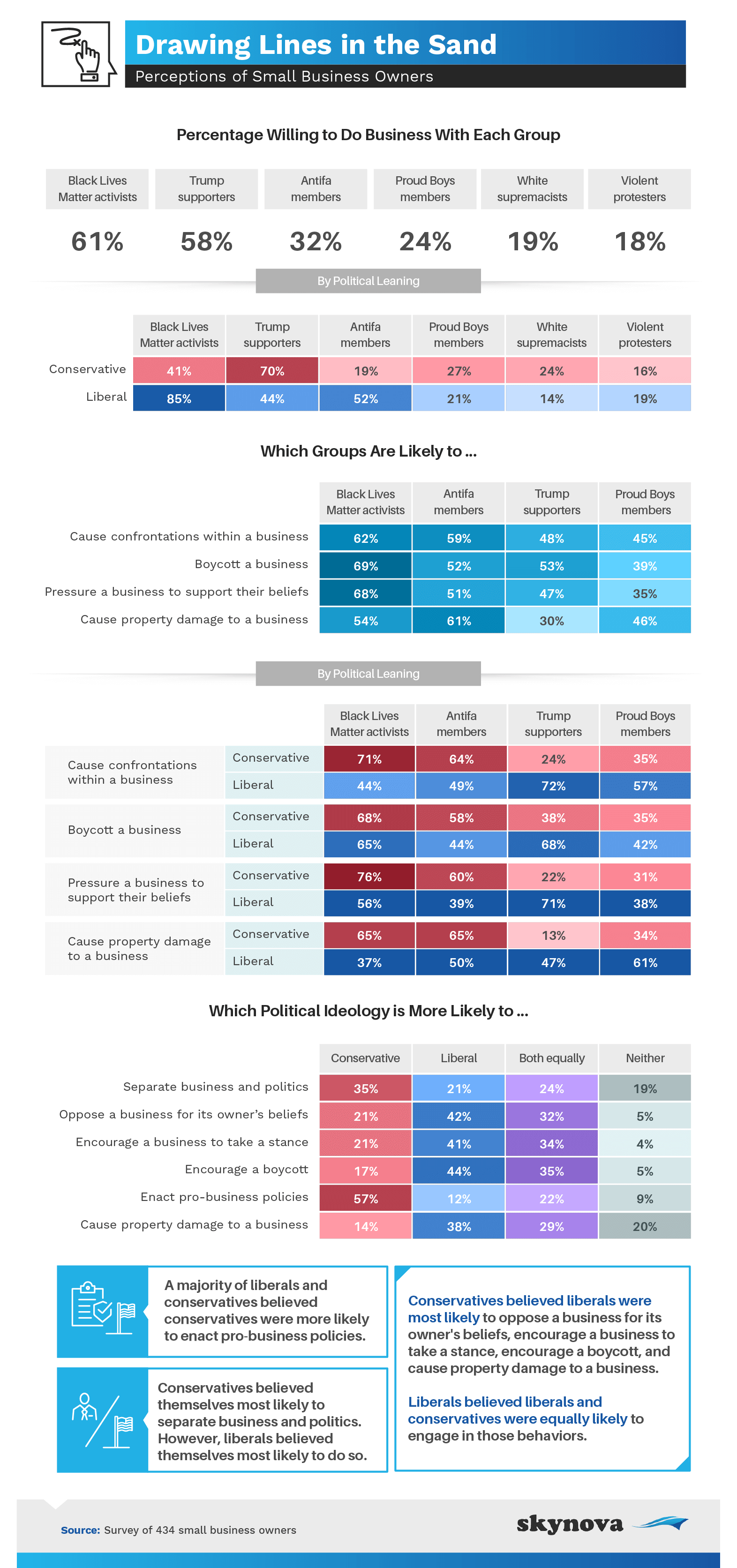
Some political views invited much more backlash than others. Overall, 64% of small business owners were willing to do business with BLM supporters, 58% were willing to serve Trump supporters, 32% would do business with Antifa members, and 24% were willing to serve Proud Boys members. Just 19% were on board with serving white supremacists, and violent protestors bottomed out the list at 18%.
On a more granular level, liberals were much more likely to feel OK doing business with BLM activists and Antifa members, while conservatives were (unsurprisingly) more likely to do business with Trump supporters. A similar pattern emerged regarding which groups owners thought were more likely to cause disturbances: For example, conservatives were more likely to believe that BLM activists and Antifa members would boycott, politically pressure, confront, or damage the property of a business, while liberals felt the same about the Proud Boys and Trump supporters.
In reality, things can get ugly on both sides. Significant destruction of property has resulted from the recent BLM protests, for example, while Trump supporters were recently caught on film harassing a news reporter during an anti-lockdown protest. The reality is that every group has the capacity to be peaceful, or not so peaceful - the danger lies in vilifying a movement at large.
Opening up about politics can be a powder keg situation for small businesses. More often than not, while owners might think it's important to care about their employees' and customers' beliefs, they tend to avoid tossing political affiliations around in order to avoid stepping on toes. Yes, there can be an upside to a business expressing its views to the public - but in many cases, our respondents believed the reward does not outweigh the risk.
Skynova provides online software solutions for small businesses, including invoice templates, accounting, timesheets, and more.
We surveyed 434 business owners using Prolific and Amazon MTurk. Our respondents were selected based on their status as entrepreneurs and small business owners. 194 respondents reported their political beliefs as conservative, 167 as liberal, and 73 as moderate. 194 respondents were female, 238 respondents were male, and two respondents did not identify as male or female. Our average respondent was approximately 38 years old.
To help ensure data accuracy, all respondents were required to identify and correctly answer a decoyed attention-check question. In some cases, questions and responses were rephrased for brevity or clarity. These data rely on self-reporting, which carries limitations, such as telescoping and recency bias.
If your readers will find this information valuable, we encourage you to share it with them for any noncommercial purposes. All we ask is that you link back to this page to allow your readers to see the full study for themselves.